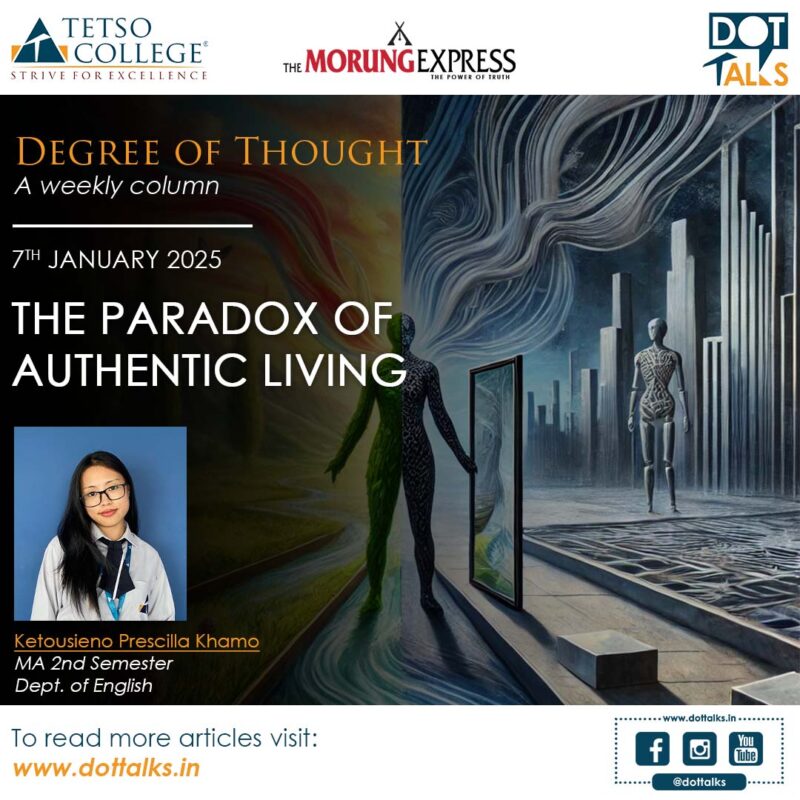
The Paradox of Authentic Living
I often find myself wrestling with the very concept and idea of authenticity and what it really means and how, in my search to “be myself”, I somehow end up more confused than ever – caught between the need to be true to myself and the desire to fit into the world around me because to live authentically is to be caught in the paradox of seeking one’s true self while knowing that this very act of seeking reshapes the self into something intangible.
“Be authentic” is advice usually given to anyone and everyone in need of guidance or support but whether it is good or bad advice is highly debated. This counsel requires us to be without fear, compromise and to live in total coalition with our inner values. Yet the very same statement “be authentic” presents a paradox, one that challenges the very essence of human experience as the questions arise; can we truly be authentic in a society that commands conformity? Is it possible to “be authentic” while still maintaining and adhering to society’s rules and regulations?
The argument lies in the definition of what makes up a person’s true self. While some believe there is much beauty and bravery in being unapologetically yourself in a society that demands you to be anything but-especially when the environment implements a certain pattern or system where individuality becomes a problem, others see it as a nuisance and more of a lack of discipline and regulation.
The essence of authenticity exists within one’s ability to be true, pure and original be it in reference to their belief system, principles and values in life or even just their tastes in food, fashion and aesthetics. All in all, it should align within the individual’s true inner self along with a rigid, strong foundation in said self as authenticity requires the inability to be swayed by external forces and pressures. To be authentic is to be self aware, in tune with one’s emotions and feelings, it is the ability to see past biases and completely and fully embrace oneself, flaws and strengths all together. While being authentic can be very rewarding and gratifying, like all things, it comes with its challenges. Individualism is often met with criticism and judgement, the ‘fear of the unknown’ mindset often plays at hand as being different from the crowd usually means to go against social norms and construct thus naturally bringing about denunciation.
This is where the whole “be yourself” or “be authentic” advice becomes somewhat contradictory. The paradox of authentic living alludes to the contrast of living life authentically according to one’s own desire and free will against that of societal norms, pressures and expectations. Expect that to live authentically or to be unique requires the admission that the very society one is trying to detach from is what has moulded them in some shape or form.
For example, in today’s world, the pursuit of authenticity itself can be influenced by external platforms such as social and traditional media, politics and social movements, etc. The masses end up trying their best to “authentically” express themselves in a way that conforms to social expectations of what they think it means to be authentic or successful. In a world that progressively only seem to emphasize individualism and self-expression, the idea of living authentically has now become a fundamental and essential theme in the journey of personal growth and well-being.
When we talk about this very paradox of authentic living, it starts with the concept and the idea of what the “self” really is. There is a common assumption that authenticity is about discovering the “self” then proceeding to maintaining and nurturing the “discovered self” which remains stable throughout the individual’s life. However, this concept is somewhat distorted as the “self” is not a static form- it is a fluid, ever growing, linear construct shaped by experiences, relationships which is much more comprehensive than initially (generally or naturally) perceived. What feels true and authentic to us at one point in life may not remain the same overtime therefore, the paradox of authenticity starts with the assumption that there is a constant, a central self to return to. In reality, living authentically is a complex process of three key elements which are self-discovery, adaptation, and evolution.
The paradox of authenticity deepens when societal pressures come into play. External forces, like the pursuit of social approval, success, and belonging, often clash with the desire for personal authenticity. The need for validation can lead people to align with societal ideals rather than express their true selves.
This tension makes it challenging to “be yourself” in environments that promote specific norms and expectations. Whether it’s conforming to appearances, behaviors, or measures of success, these external demands frequently push individuals to compromise their authenticity.
As society increasingly values individuality, authenticity has become essential. However, the pressure to appear authentic often leads to paradoxical situations where people seek social validation rather than genuinely expressing themselves. This performative version of authenticity blurs the line between true and superficial living.
The paradox deepens with the fear of rejection. Authenticity demands vulnerability—acknowledging flaws and embracing discomfort—yet the desire for acceptance can make this feel risky. True authenticity requires confronting societal pressures and personal fears, even at the cost of potential alienation.
Living authentically is transformative because it challenges ingrained beliefs and fosters growth. It is less about achieving a fixed state and more about embracing an evolving journey. By staying true to one’s core values while remaining open to change, authenticity becomes a practice of self-exploration, not perfection. Ultimately, it is about navigating this paradox with grace, embracing who you are, and growing with life’s changes.
Degree of Thought is a weekly community column initiated by Tetso College in partnership with The Morung Express. Degree of Thought will delve into the social, cultural, political and educational issues around us. The views expressed here do not reflect the opinion of the institution. Tetso College is a NAAC Accredited UGC recognised Commerce and Arts College. The editorial team includes Chubamenla, Asst. Professor, Dept. of English and Rinsit Sareo, Asst. Manager, IT, Media & Communications.
For feedback or comments please email: dot@tetsocollege.org

